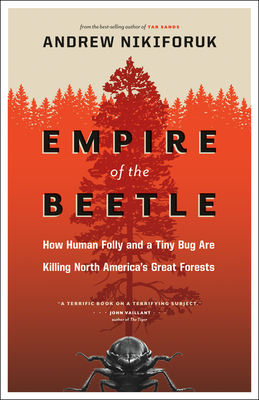 |
| Empire of the Beetle |
The beetle didn't act alone. Misguided science, out-of-control logging, bad public policy, and a hundred years of fire suppression created a volatile geography that released the world's oldest forest manager from all natural constraints. Like most human empires, the beetles exploded wildly and then crashed, leaving in their wake grieving landowners, humbled scientists, hungry animals, and altered watersheds. Although climate change triggered this complex event, human arrogance assuredly set the table. With little warning, an ancient insect pointedly exposed the frailty of seemingly stable manmade landscapes. And despite the billions of public dollars spent on control efforts, the beetles burn away like a fire that can't be put out.
Drawing on first-hand accounts from entomologists, botanists, foresters, and rural residents, award-winning journalist Andrew Nikiforuk investigates this unprecedented beetle plague, its startling implications, and the lessons it holds.
Lynn says:
"I know, I know. Beetles? But truly, it's not a dry topic. Not at all. Especially not to anyone who's been up to, say, Grand Lake this summer, where I recently took it all in that several beloved forests have turned a brittle reddish orange. On Oct. 1st, the New York Times had a fairly extensive article on the beetle-kill that really gave me pause so that same night I gave in and read the book as voraciously as those @#$%^ bark beetles devour drought-stricken pinyon trees in the Southwest!
Nikiforuk goes into the role of bark beetles as major players in the whole climate-change drama: extremes in beetle behaviors and explosive wildfires exacerbated by human efforts to rework Nature to economic ends in agriculture or forestry practices...... and ultimately what's in store for the planet if our fossil-fuel usage continues unabated.
Meticulously researched, but in a narrative that you don't need to be an entomologist to appreciate, and with the page-turning qualities of an action/intrigue novel, Empire of the Beetle lays out the beetle's reproductive behavior, dining habits, and their hosting of a veritable zoo of even tinier critters (fungi, mites, nematodes, viruses, bacteria...) that factor in to make the bug vs. human "war" underway ever more daunting. The author's description of the respective weapons of tree vs. beetle: turpenes in resins vs. the impressive chemical arsenal employed by the beetles, puts to shame the human tactics employed to eradicate the little buggers: millions of dollars put into strategies ranging from schemes to bury trees to zapping electrocution to chemical warfare to a sound-warfare tactic akin to that used against Manuel Noriega in Panama. These klutzy creatures go through a boom/bust cycle that make us humans seem.... hmmm. perhaps... analogous?
Anyway, their life cycles can be precariously vulnerable and yet at the next turn, 'operating on such a big scale that they can change entire ecosystems, if not carbon cycles', says Ken Raffa of the University of Wisconsin. The dot-connecting observations of both the author and his many passionate colleagues; fellow scientists, 'tree-huggers', economists and social critics- reveal a growing consciousness of our human place in the web of life that with luck and dedication may help break through to a healthier coexistence within this web of life."
No comments:
Post a Comment